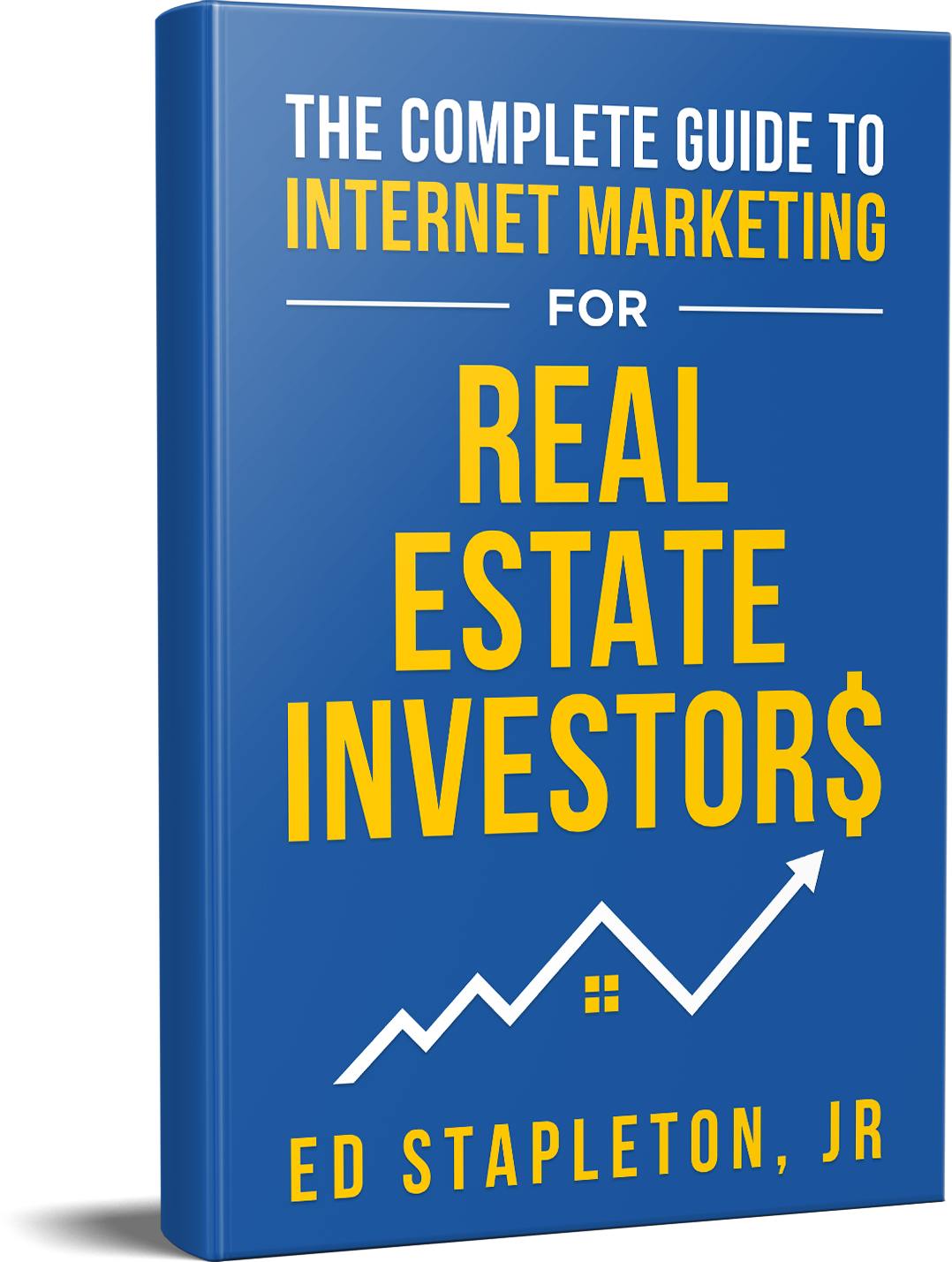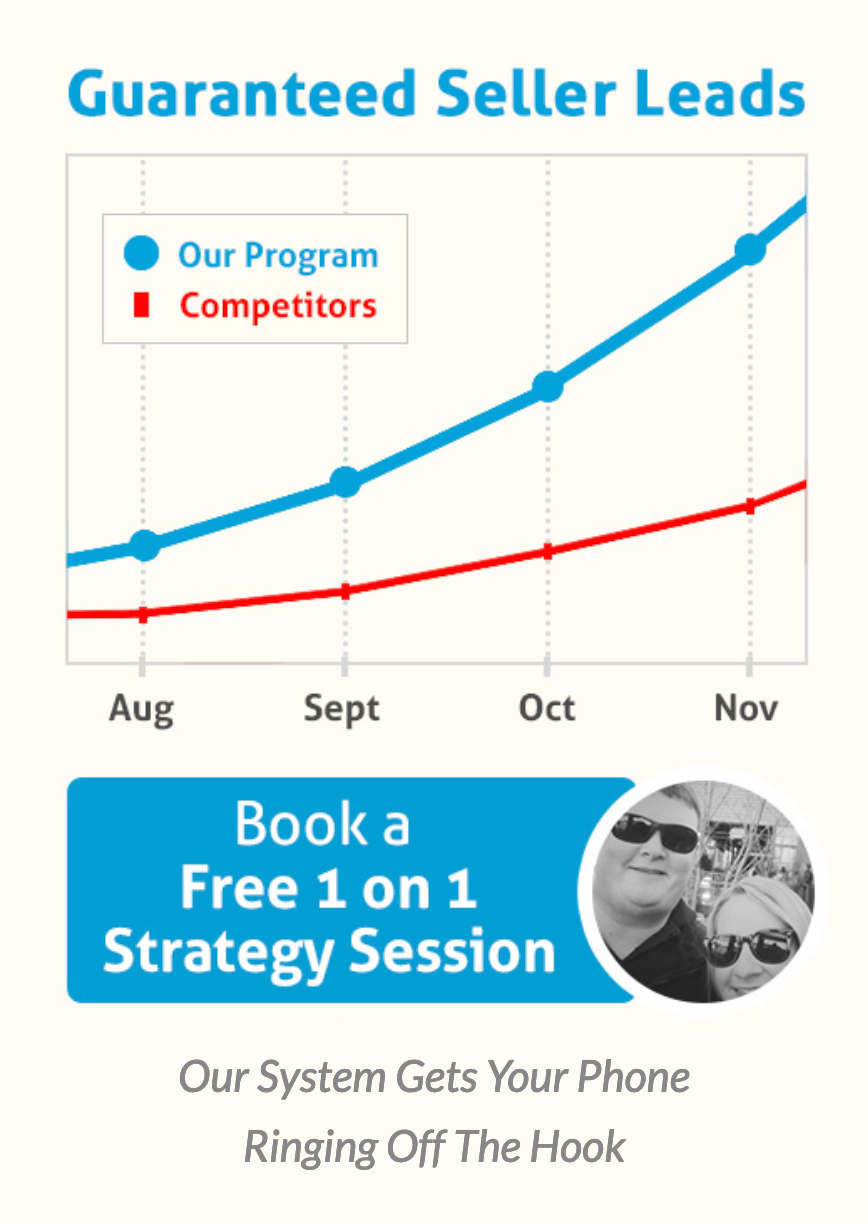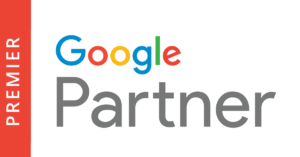PPC for Real Estate Investors – The Ultimate Google Ads Strategy
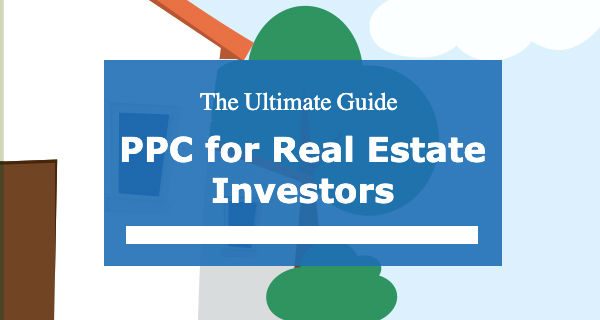
PPC For Real Estate Investors
When it comes to quickly generating distressed motivated seller leads nothing is better than PPC for real estate investors.
Are you looking to take your real estate investing firm to the next level with a proper pay-per-click advertising campaign?
We’ve worked with tons of real estate investors since 2015 and know the industry like the back of our hands.
The following guide has everything you’ll need in order to generate more quality leads from your PPC advertising campaigns.
Your PPC strategy should be one of your top priorities when it comes to ensuring the survival and growth of your real estate investment firm.
The vast majority of home sellers go straight to Google when it comes to finding a buyer.
100s, if not 1000s, of searches per month are made in your area around phrases such as ‘sell my home’, ‘home buyers’, and many more high-intent variations.
Most of these people searching don’t spend much time scrolling down Google so this is why it’s more important than ever that you are listed in the top results when homeowners sit down at their computers and start researching.
This guide will cover everything we do when it comes to laying out perfect PPC for real estate investors.
What is PPC?
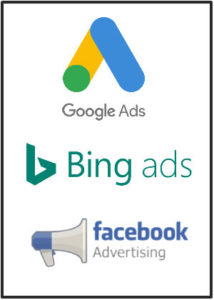
The acronym, PPC stands for pay-per-click and refers to a model of online advertising where you pay for every click on your ad. Users click your ads and you can direct them to your company website where they can reach out for your services.
PPC is a broad term which applies to all of the following…
- Google Ads
- Bings Ads
- Facebook/Instagram Ads
PPC advertising can produce extremely fast, affordable, and consistent leads for your business if done correctly.
Pay per click allow you to instantly put your company in-front of a home seller and get them calling you today!
Let’s dive into how they can work for you.
Successful Pay-Per-Click (PPC) Campaigns for Real Estate Investment Companies
We’ve talked with a lot of investors throughout the United States and many of them have a very negative perception of PPC advertising.
Generally, these investors fall into one of two scenarios.
Scenario 1 is that they have already spent thousands of dollars on PPC with very little to no return on investment — essentially, they’ve been throwing money down the drain.
Scenario 2 is that they see the average cost per clicks for related search phrases, usually between $15-$50 and can’t fathom spending that much for a website visitor.
However, these fears should not keep you from investing in online advertising.
Scenario one is usually the result of a business owner attempting to run ads but not knowing how the AdWords platform works. Alternatively, it could be the case these investors have hired generic ad agencies who a) don’t know the industry and b) provide low-quality work (we’ve seen a lot of these).
Second, we can understand the fear involved with scenario two but urge the business owner to think in terms of revenue and profit. Yes, a single click can be expensive but this is low compared the 5-figures you could make from a single deal.
We’ve seen so many home investors that go into AdWords, pick some keywords off the top of their head and stuff them all into a single ad group to save time. Further, they bid either too high or too low and send people straight to the home page of their main website. This is the wrong way to do it and is what will lead to wasting thousands of dollars with nothing to show for it.
Google wants your ad listing to be relevant to what the user searched for. For this reason, the quality of your ads and the page users land on effects where your ad is placed as well as how much you’ll pay for a click.
If someone searches for ‘need a buyer for my home’, your ad won’t perform well if it:
- Doesn’t include some variation of the search phrase
- Doesn’t give the person incentive to call you
- Doesn’t give a reason why your company is the best choice over others
Everything above also applies to the page you send users to — the page must be relevant.
Your web page must be clear, answers questions, sells your services, and tells the person what to do next. Without these, you’ll pay for clicks but get no leads.
So what’s the right way to do this then?
The first step to building a high-performing PPC campaign is to first plan out the services you want to advertise for.Then, you’ll perform keyword research to determine high-intent keywords that people are searching for in your area around those services.
With a list of keywords, you’ll then want to organize these into groups so that you can write relevant ads for each and send users to the right web pages.
Do this and Google will reward you with high positions and cheaper clicks.
The Real Benefit of Pay Per Click Ads for Investors
You may still be asking, “what is the benefit of pay-per-click advertising like Google and Bing Ads?”
Why spend money on PPC when you can get free traffic by investing in SEO for your real estate investment firm?
We’ve listed a few reasons below whey PPC is such a solid strategy for investors.
- The results are virtually instantaneous. You can set up an AdWords campaign within a day and have your ads showing at the very top of Google search results. This can take 6-12 months to accomplish with just SEO.
- Hyper-targeting. You can choose to target specific keywords, locations, days and times, demographics like income, gender, and age, as well as psychographics such as what people are in the market for.
- You’ll be serving ads to people ready to sell. Less persuasion is necessary when the user has told you they need someone to buy their home. The user searches, clicks your ad, sees your website, and reaches out by phone or email… it’s that simple.
The Different PPC Platforms
As mentioned before, PPC is a broad term and applies to many platforms that offer advertising. However, the two main players in this game are Google Ads (AdWords) and Bing Ads.
These are the two we focus most of our client’s advertising budget on because they are search-based.
With social ads, the intent of the user is less known because people don’t go to social platforms to search for solutions to their problems. For this reason, these advertising platforms can be a bit more complex as well as hit-or-miss.
On the flip-side, users tell you exactly what they need with search engines like Google and Bing.
With Google Ads, you can run a variety of different ad formats such as search, display (images on Google’s partner sites), and video (YouTube). Google provides the biggest opportunity so is the first platform we suggest you focus your attention on.
Bing ads are fairly similar to Google but will usually a) provide less leads since less people use it and b) attract a different type of client since the demographics of Bing users are slightly different than that of Google.
Google owns 90%+ of the market share so we suggest focusing most of your attention there and perhaps allocating 10% of your budget to Bing as this platform can sometimes provide good results.
The cost per click of Bing ads is generally less than AdWords (less competition) so this platform could be a hidden gem for some firms.
How the Process Works
Let’s briefly cover how Google Ads works.
First, AdWords is an auction-based system that places your ad in certain positions based on several criteria.
Most people assume ads are placed solely on the max cost per click (CPC) the advertiser is willing to spend but this is only one factor.
Unfortunately, Google Ads for real estate investors are not as simple as bidding higher to achieve the first position.
As mentioned earlier, Google care about showing users highly relevant ads. Because of this, they can’t just allow the highest bidder to get the top position. Instead, they use what is called, quality score, to help determine ad placement.
The more users click your ads the more money Google makes so they incentive relevancy using quality score.
Quality Score
Quality score is a metric from 1-10 that rates your ads based on the keyword targeting, ad, and landing page quality of your campaigns.
The quality score of your ads can be seen as a multiplier. A good quality score will reduce the amount you need to pay per click to achieve a certain position whereas a bad score will increase how much you’ll need to spend to achieve the same position.
Your quality score depends on a multiple of factors, including:
- Ad click through rate (CTR)
- The relevancy of your ad copy to your ad group’s keywords
- Landing page quality and relevancy
- AdWords historical performance
And a variety of other factors…
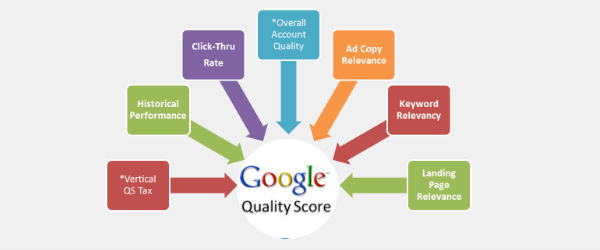
No one besides Google developers know exactly how much each factor is weighed but it is well accepted that CTR plays an important role.
Google will typically reward advertisers with high CTRs with higher ad ranks and lower overall costs per click.
How RE Investors can Get Amazing ROI with Google Ads
How can one really get this done correctly?
In order to maximize the effectiveness of your PPC ads it’s important to first split keywords into relevant ad groups as mentioned earlier in this guide.
Second, you’ll want to pay close attention to the text that you’re writing in the ad itself. Ad text can make or break performance is generally overlooked by most investors running AdWords.
Lastly, you’ll want to send traffic to a dedicated web page that addresses the exact service mentioned in your ad. Most home pages are not well designed for PPC advertising so you’ll want to make sure you make something specific for your ad traffic.
Do these three things and you’re already way ahead of the curve.
Know Your Budget
The very first thing you’ll need to decide before building the account is your monthly budget for ad spend.
It’s crucial to have a number in mind from the beginning as this will inform your keyword selection and overall campaign strategy.
For most real estate investors, even in smaller cities, we recommend having at least $3000/month to allocate to Google Ads.
Anything less than this number will make it difficult for you to achieve your desired results.
At first glance, a minimum of $3000 can scare some companies away but once again I encourage you to think of this in terms of ROI. If that 3k lands you one deal it’ll pay for itself.
Here’s some average figures we’ve seen in the industry for you to make estimates off of:
- Our campaigns generally will get an average conversion rate of 20% or more. So this means that for every 5 clicks to your website 1 person will reach out by phone or email.
- The CPC will vary depending on what market your in but, as mentioned, we see anywhere between $20-$60 per click.
Know Your Sales Numbers
It is crucial for your company to know its sales numbers before investing in Google Ads.
Let’s say for every 10 leads you close 1 deal (portfolio, wholesale, or flip). In this case you have 10% closing ratio.
Let’s also say that you have $3000 per month budgeted towards ad spend. Your average cost per click is $30.
$3000 / $30 = 100 clicks
Then, calculate the conversion to lead percentage. Ours is 20% on the low end so we’ll use that as a conservative estimate.
.20 * 100 = 20 leads
From the math above, you can expect to get 20 leads per month with your $3000 in ad spend.
Now, assume your close percentage is 10%. This means you’ll close around 2 extra deals per month.
Now let’s say you make, on average, $20,000 profit per deal.
2 * $20,000 = $40,000
In this scenario, you just spent $3000 and got $40,000 back in profit. That’s a more than 10X ROI!

These numbers are just estimates and will vary, of course, but the above process will help to give you an idea of what to expect with Google PPC Ads.
How to Setup the Perfect Real Estate Investment AdWords Campaign
Do the above numbers make sense for you?
If so, it’s time to start building your campaign!
Keyword Research
The first step is keyword research which can be done with a variety of tools.
- Google AdWords Keyword Planner
- SEMrush
- Ahrefs
Gather all the keywords based on the services you want to promote and group these together by relevance.
I’ve listed an example ad group below with some associated keyword phrases:
Ad Group: Sell My House
Keywords: cash home buyers, sell my home fast, cash for houses, companies that buy houses
You can see how the keywords in the ad group above are all very similar in nature and user intent. It’s reasonable to lump these all under the same ad group since a single ad will address all of them properly.
So an immediate step for you to take is to open up a spreadsheet and start researching keywords to create ad groups with.
Negative Keywords
Most people stop after they’ve found all the keywords they want to target — the majority forget this next important step!
Perhaps the #1 reason businesses burn through their budgets so quickly is because they don’t add negative keywords to their campaigns.
Negative keywords tell Google when not to show your ads.
You can specify the words or phrases that must exist in a user’s search for your ads to not show.
For real estate investors, there are HUNDREDS of words you don’t want your ads to show on.
Some examples:
- Most searches indicating the need for a realtor
- All your competitors as well as national brands
- Jobs, classes, and certification type searches
You don’t want your ads showing for these terms because a) you’ll get useless clicks that cost you money and b) you’ll improve your ads CTR which will improve your ad quality score.
Make sure to create an extensive list of negatives right off the bat in order to avoid wasting money.
Ad Groups
As mentioned before, you’ll want to group keywords so that the ads shown to users are highly relevant to the search they made.
You can get really fancy with ad groups but I’ll mention one split you may want to consider doing.
Sell My Home | General
This ad group would contain all the general terms around people ‘selling their home’
Sell My Home | FAST
This ad group would contain all the keywords containing some form of the word fast, quick, urgent. The reason we split this out from the generally is to a) hammer on ‘urgency’ in the ad text and b) see if there is a difference in performance.
Sell My Home | Detroit
This ad group would contain keywords that have a geo-modifier attached in the search phrase. The idea, once again, is to indicate location in the ad text and see if there is a difference in performance from the general terms. These geo-modified terms can be towns, cities, states, counties, and even zip codes.
Keyword Match Types
The other thing to keep in mind is the match type of the keyword you place in the ad groups.
Google has several variations of keywords that you can use called, Match Types. I’ve listed those below.
- Broad Match
- Broad Match Modified
- Phrase Match
- Exact Match
It’s important to know the difference because each will show on different types of searches.
We almost never use broad match keywords because these will show for too many irrelevant searches.
We’ll typically stick with broad match modified, phrase, and exact match keywords.
Let’s use the keyword ‘sell my house’ to explain the differences in match types.
A broad match keyword is indicated with just the text sell my house and no other symbols. This match type tells Google to show your ads on searches that have similar intent to your key phrase. This means that Google will show your ads for people searching for realtors, info on selling a home, and even people looking to buy. The match type is far too broad.
The broad match modified keyword looks like, +sell +my +home. Plus symbols indicate to Google that you only want your ad to show on searches that contain all of the words given (or some variation of each). This means your ads would show on user searches such as, ‘I would like to sell my house’,’how to sell my inherited home fast’, etc.
As you can see, the broad match modified version of the keyword is much more specific and will lead to better performance.
Phrase Match: “sell my home”
Phrase match ensures that your ad will only trigger on searches that contain all of the words and in the exact order specified.
An example search would be, ‘need to sell my home within the next year’.
Changes have recently been made to this match type to include synonyms, stop words, and misspellings but ultimately this match type is much more specific than broad.
Exact Match: [sell my home]
Exact match will only trigger your ads when someone makes the exact search you specified. In this case, this keyword would trigger only on the search, ‘sell my home’.
However, changes have been made to the exact match keyword type as well. These changes will allow for slight variations as well as stop words and geo modifiers.
Generally, we’ll mix in a variety of broad match modified, phrase, and exact to test differences in performance and capture as much market share as possible.
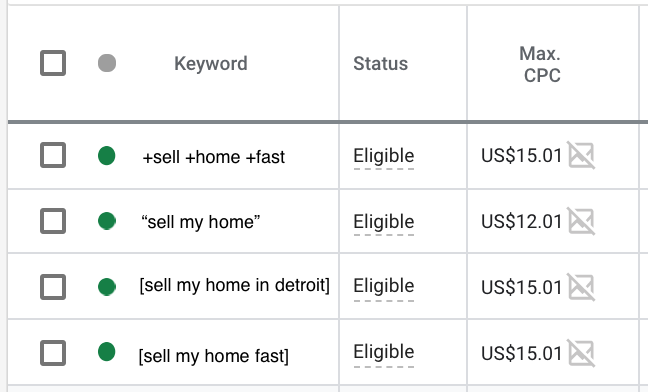
Campaign Settings
Initial setup of your campaigns is crucial for success.
You’ll be presented a series of steps when first setting up your AdWords campaign.
Campaign Goal: Since we’re looking to get phone calls and form submissions you’ll want to select ‘Leads’ as the campaign goal.
Campaign Type: As mentioned previously, there are a variety of campaign types to choose from; search, display, video, etc. We recommend beginning with a search campaign since these are the standard ads that will display in the search results area of Google. You can definitely leverage display and video ads but we’d suggest doing these further down the road if you goal is to get leads immediately.
Title Your Campaign: The title of your campaign is really only for organizational purposes. We’ll sometimes test multiple campaigns but for now, stick with one and name it whatever makes sense to you — ‘Cash for Homes’
Networks: There’s a few options in the network section of your account that control where your ads can be seen. We suggest unchecking the “Include Google search partners” and “Include Google Display Network’ options since these will show your ads on alternative platforms. We’ve found these generally don’t convert as well as the normal search results ads.
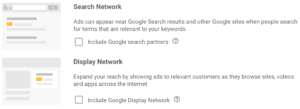
Locations: You can select specific locations (towns, cities, states, zip codes, counties) to show your ads in and or target a radius around a certain area. Additionally, you can choose to exclude areas if you find a certain area to be low-value.
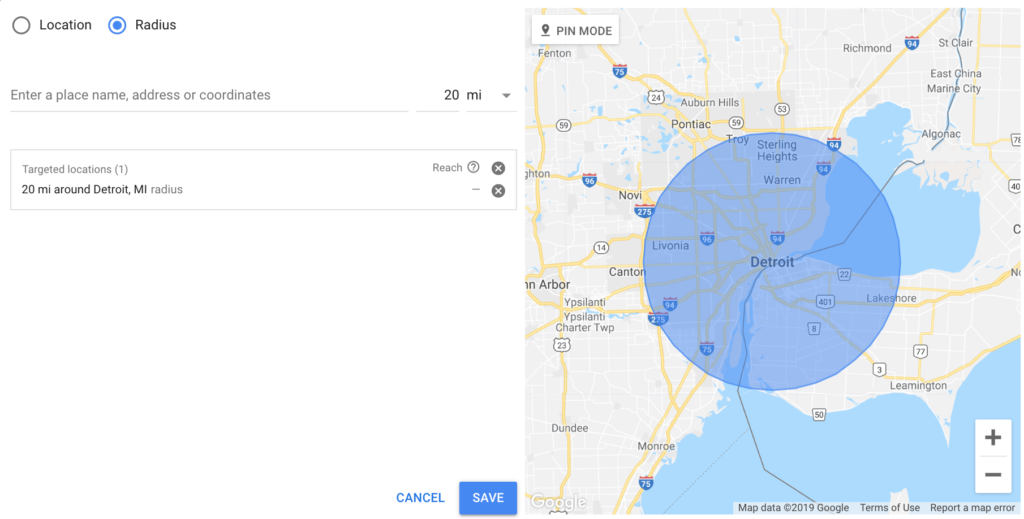
Note: By default, Google’s location targeting is set to ‘people in or searching for your target locations.’ Even though this feature is labeled ‘recommended’ by Google, we suggest changing this to ‘people in your target location’.
People ‘searching for’ will show your ads to people who are out of your target zone which can lead to wasted clicks.
Budget: Google will then ask you how much you would like to spend per day. For this, just take your monthly ad budget and divide by 30 since this is the average days per month.
Bidding: We generally stick to manual bidding since it gives the most control over your campaigns but you can choose a more automated strategy such as ‘maximize conversions’ or ‘target CPA’.
Setting Up Your Ads
The ad setup process is quite simple but there are a few things to keep in mind:
- You want your ads to be extremely relevant to the user’s search query
- You want your ads to draw attention and make people click
Below, you’ll find a good example of a ‘cash for homes’ ad.
Headline 1: Include your main keyword
Sell Your House As Is for Cash
Headline 2: Include benefits of your services, special offers, trust signals, and anything else that will encourage the user to click.
Get a Cash Offer in 48 Hours
Display Path: Use the main keyword or a partial variation
/cash-offers
Description 1: Re-state the benefits of your service compared to others and include a call to action.
Call Now. Sell Your House As-Is, At a Fair Price, Close on Day of Your Choice. We Pay Cash. Any Condition Property.
Description 2: Same as the above. Continue selling your service and make it clear what the user need to do next.
We recommend that you write at least two different versions of an ad per ad group so that you can test for differences in performance.
Ad Extensions
Ad extensions are attachments to your ads that provide certain links to your website, additional information about services, and even the ability to directly call your phone. The more extensions you have the better. Extensions make your ads bigger, provide more information, and will ultimately help improve your ads’ quality scores.
Call Extension: When enabled, call extensions will show on your ads displaying your phone number and giving the user the ability to click to call your business. These extensions are a must have since they skip the who landing page process and get you leads straight from an ad itself.
Sitelink Extension: These are links that display under your ads that provide quick links to certain pages of your website. If you’re using a landing page, these likely won’t be necessary unless you have other landing pages for different services that you’d also like to link to.
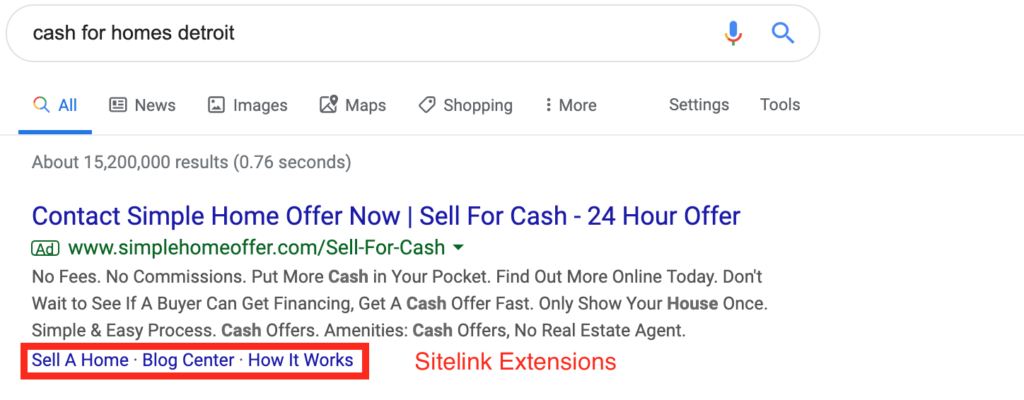
Callout Extension: Callouts are small lines of text that simply add more information to your ad. We suggest you treat these as small sales headlines to hit on the benefits that people care most about. These are great for additional selling as well as making your ad bigger on the search results page (leading to more clicks).
Structured Snippet Extension: Structured snippets are categories that display under your ad and can be used to list of brands, services, styles, etc.
Form Extension (NEW): Just recently, Google released a new extension that is similar to the call extension but allows the user to input their contact information into a form directly from the ad itself. These are brand new so we’ve just started testing them and would suggest you do the same.
Conversion & Call Tracking
If you aren’t tracking conversions than you’re throwing money into the wind.
Without knowing what is leading to deals there is no way to know account performance and improve your ads.
You might as well pause your ads right this minute if you don’t have conversion tracking setup… that’s how important it is.
There are three types of conversions that we setup:
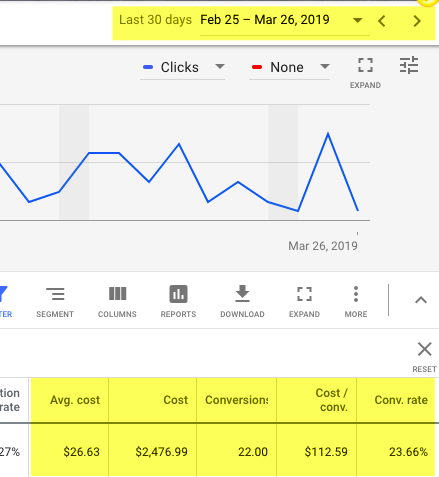
- Calls from Landing Page. This will track people who click the ad and call from your website.
- Contact form submissions. This will track every time someone lands on a ‘Thank You’ page after submitting a form.
- Ad Extension Calls. This will track phone calls made to the click to call feature on your ads when you have call extensions enabled.
Make sure you are tracking all three of these before moving any further.
Landing Pages
You’ll want a landing page for each service that you’re promoting.
Ideally, your landing pages should have the following characteristics:
- The main keyword somewhere in the top headline (H1)
- No navigation bar
- Sales information — Bullet point benefits of your service
- Relevant imagery
- A short contact form
- Mobile-friendly design — the site looks good on mobile devices.
- Include the areas you purchase homes in
- Reviews, testimonials, and proof
- Trust symbols like accreditations, rewards, and years in business
Remember that your landing page plays a HUGE role in the success of your campaigns. You can send the best traffic to the web page but if it doesn’t convert you won’t make any money.

Analytics & Monitoring
Once you launch your campaigns, it’s time to let your ads do their thing. We suggest jumping in the account several hours or a day later to see if impressions and clicks are occurring.
Most people assume you can just let the campaigns run and that’s it but Google Ads is really a long process of continual tweaking to get things right.
You’ll want to consistently be looking at your AdWords data within the first several months to see which as groups, keywords, and ads are performing the best.
The initial goal is to get your lead cost as low as possible while maintaining volume. Once this is done, you can scale up how much money you allocate to ads to increase the total leads.
Once you scale, it’s simply a matter of putting $1 in to get $5 back. This is the power of pay per click advertising.
We have some investors spending $20,000 per month in ads while others are spending $3000. Who do you think is getting the better return?
You guessed it. The investor spending $20k.
Start small, optimize your account, and then scale everything from there!
Facebook Advertising
As mentioned, FB also offers PPC advertising.
However, we suggest focusing on Social ads later on in the process.
The leads on social platforms are generally earlier on in the selling process than leads coming from search engines so the approach changes — these leads require more persuasion and follow-up.
This is why social platforms are great for retargeting home seller leads because you can recapture traffic that comes to your website from Google but doesn’t convert.
Sometimes these people just need some more time and education to reach out for your services.
PPC for Real Estate Investors: Are You Using Online Paid Advertising to Your Advantage?
PPC campaigns are an exceptional way to increase traffic and fuel growth of your real estate investment business. Paid ads can make sure your brand is the first thing local homeowners see when they are looking to sell their property.
An effective PPC campaign takes deep industry knowledge and patience in order to perfect but the end result is worth it. Get House Deals has been building successful real estate investment pay per click campaigns for the past 5 years.
Contact us today to get a Free Audit and Strategy Session. We’ll provide you with a complete game-plan to ensure you’re the #1 investor in your local area.
